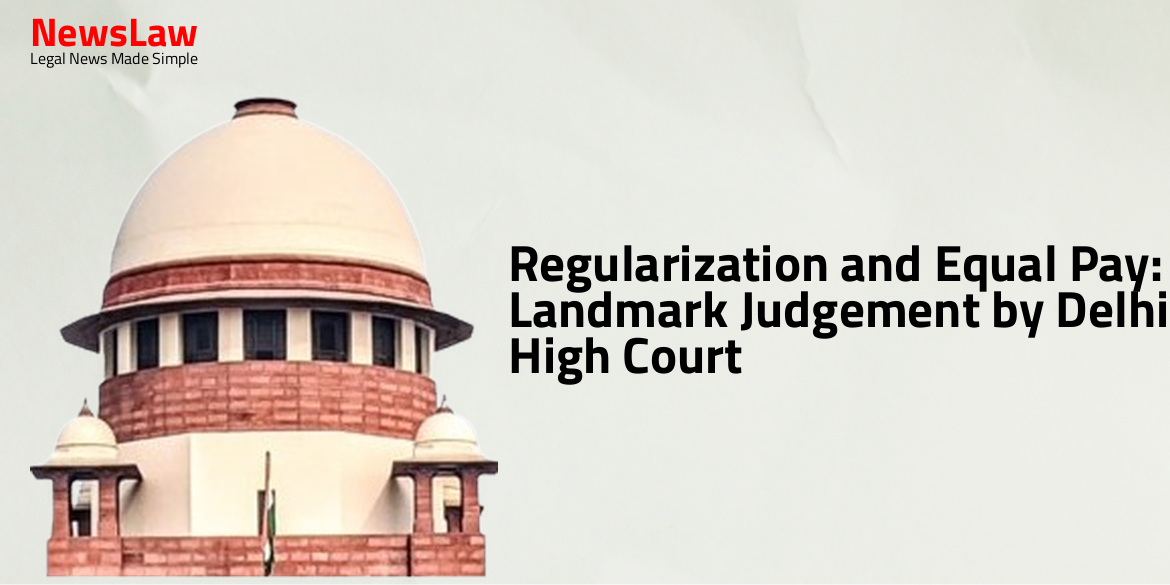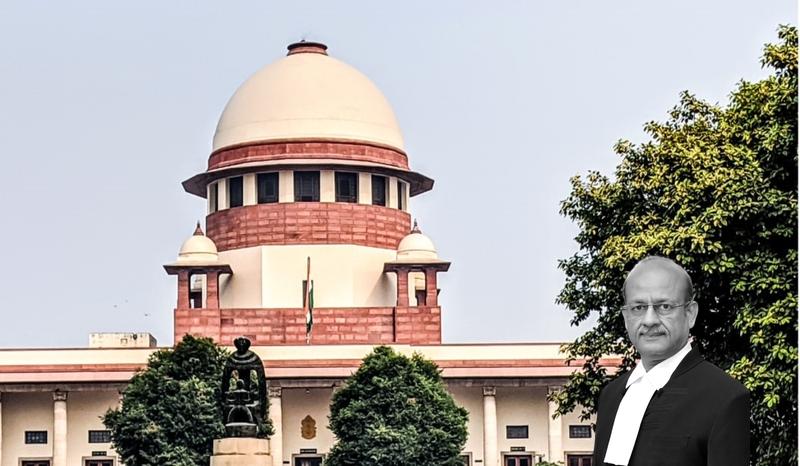In a significant legal development, the Delhi High Court has delivered a landmark judgement in the case concerning the regularization and equal pay of workmen. The judgement addresses the rights of the workmen against the entity, highlighting crucial aspects of labor laws and fairness in employment practices.
Facts
- The petitioner, South Delhi Municipal Corporation, emerged in 2012 from the trifurcation of the Municipal Corporation of Delhi.
- The Industrial Tribunal passed an Award on 13 November, 2019, in favor of the respondent workmen seeking regularization.
- The respondent workmen were engaged on a contractual basis in 2010 for the posts of Assistant Malaria Inspector and Assistant Public Health Inspector.
- In 2014, the respondent workmen filed a claim for regularization and differential wages from the date of their initial appointment.
- The present batch of petitions under Articles 226 and 227 of the Constitution of India is related to awards of the Industrial Tribunal favoring the respondent workmen.
- The respondent workmen were selected through a proper selection procedure, including interview, police verification, and medical examination.
- The Tribunal held that the workmen are entitled to be regularized to the posts of AMI and APHI from the date of their initial appointment.
- The workmen are also entitled to the difference in wages based on the principle of equal pay for equal work.
Issue
- The Tribunal framed four issues to be addressed in the judgement.
- The first issue was whether there exists a relationship of employer and employee between the parties.
- The second issue focused on whether the claim of the workmen was properly espoused by the Union.
- The third issue dealt with determining whether the workmen are entitled to their claim as per the terms of reference.
- The fourth issue aimed at determining the relief that the parties are entitled to.
Arguments
- The petitioner entity argues that the non-regularisation of the workmen’s services should not lead to unfair labor practices.
- The work carried out by the workmen is of a regular nature, as admitted by a witness on behalf of the petitioner.
- The petition claims that seeking re-appreciation of findings by the Industrial Tribunal is not permissible under law through a writ petition.
- The petitioner argues that the Industrial Tribunal’s award was made without considering all evidence, facts, and circumstances, and should be set aside.
- It is contended that the award by the Industrial Tribunal correctly identified the entity’s unfair labor practices.
- The Tribunal’s decision to regularize the services of the workmen is seen as a rightful move.
- The petitioner is accused of trying to misuse legal proceedings to harass the workmen and deny them their rightful relief.
- The CAT has often ruled in favor of regularizing contract employees in similar positions, supporting the workmen’s claims.
- The entity’s use of contractual appointments to deny statutory rights is criticized.
- The petitioner claims that the workmen were well aware of the contractual nature of their appointments and hence should not seek regularization.
- The petition argues that the appointment terms clearly indicated a contractual basis, aiming to prevent a flood of applicants who would have applied if they knew about potential regularization.
- The Industrial Tribunal’s failure to consider the contractual nature of the appointments and the stopgap arrangement is highlighted as an error in law.
- The petitioner asserts that the appointments were made in the public interest as temporary measures until regular appointments could be made through DSSB recruitment processes.
- Fresh arguments raised by the petitioner in the writ petition, not presented before the Industrial Tribunal, are contested as a ground for dismissal.
- The respondent workmen have been continuously working in their positions for ten years, conflicting with the petitioner’s argument that they were stopgap arrangements.
- The petitioner requests the dismissal of the petition and that the relief sought is granted.
- The respondent workmen have been working for the petitioner entity for almost ten years and are seeking regularization of their services.
- The respondent workmen have been working against vacant posts with duties similar to regular Field Workers but receiving lower wages per Minimum Wages Act.
- The Industrial Tribunal held that the respondent workmen were entitled to regularization and equal pay for equal work.
- The Union of workmen appropriately espoused the dispute, qualifying it as an industrial dispute.
- The management failed to provide any document to rebut the Union’s claim of espousal.
- The argument that the impugned Award goes against the Secretary, State of Karnataka Vs Uma Devi (Supra) case is deemed untenable by the respondent’s counsel.
- The respondent’s counsel cited other judgments in support of the claim of regularization for the respondent workmen.
- The respondent workmen argue that the petition lacks merit and should be dismissed.
Analysis
- The management admitted in cross-examination that the workmen were employed as Assistant Malaria Inspector and Assistant Public Health Inspector on a contractual basis.
- The workmen had been continuously employed in these roles since September/October 2010, as per their own admission and documents presented.
- The management had no defense against the assertion that the workmen were not receiving the same benefits as their regular counterparts performing similar duties.
- The one-day break given to the workmen every six months was not justified by any management policy, as admitted in cross-examination.
- The Tribunal found that the management’s treatment of the workmen as contractual employees for 13 years amounted to unfair labor practices.
- The workmen’s cause was properly espoused by the union, as per the resolution passed in their support.
- The continuous service of the workmen created a legitimate expectation of permanency, justifying their claim for regularization.
- The financial strain on the management due to regularization was deemed legally untenable by the Tribunal.
- The judgment highlighted the distinction between irregular and illegal appointments and emphasized the need to consider regularization based on principles of fairness and equity.
- The Tribunal’s decision in favor of regularizing the workmen was based on the evidence of continuous employment and similarity of work to regular employees.
- Employees who have been continuously employed for a significant period should not be treated as temporary forever.
- Regularisation of employees who have followed proper recruitment procedures, such as written examinations or interviews, is lawful.
- Temporary or contractual status should not be a ground for depriving employees of equal pay if duties are similar to regular employees.
- Judgments emphasize on equal pay for equal work to prevent exploitation and ensure fairness and justice in labor practices.
- Differentiation in pay and benefits for employees doing the same work violates Article 14 and Article 39(d) of the Constitution of India.
- The court’s writ jurisdiction is supervisory and not appellate in nature.
- A court or tribunal’s finding of fact, even if erroneous, cannot be challenged in certiorari proceedings due to insufficient evidence.
- The court will not re-examine evidence or substitute its own factual conclusions for those of the adjudicating body.
- The respondent workmen are entitled to regularisation as they were selected through a proper procedure, have worked for a long period, and perform similar work to regular employees.
Decision
- The impugned award dated 13 November, 2019 passed by the learned Presiding Officer, Industrial Tribunal, Rouse Avenue Courts Complex, New Delhi in case bearing I.D No. 58/2016 has been upheld.
- The impugned awards in the batch of petitions have also been upheld.
- The batch of petitions is dismissed along with any pending applications.
Case Title: SOUTH DELHI MUNICIPAL CORPORATION Vs. VISHANT KUMAR KHOLIYA AND OT.HERS (2024:DHC:4712)
Case Number: W.P.(C)-8391/2020



